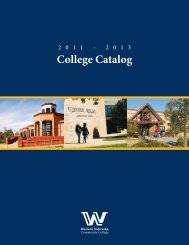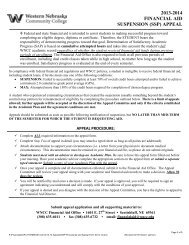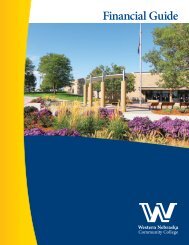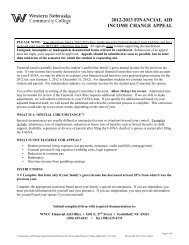WNCC 2010 Self-Study Report - Western Nebraska Community ...
WNCC 2010 Self-Study Report - Western Nebraska Community ...
WNCC 2010 Self-Study Report - Western Nebraska Community ...
Create successful ePaper yourself
Turn your PDF publications into a flip-book with our unique Google optimized e-Paper software.
elative to the type of degree or professional certification being sought, ranging from 12 hours for<br />
an Associate of Applied Science degree to 33 hours for an Associate of Arts award.<br />
Student Advising<br />
In an effort to ensure that students complete the required courses for their degree programs,<br />
students are given detailed advice about what courses must be taken to meet the generaleducation<br />
and discipline-specific requirements for their programs. Normally, first-semester<br />
students are advised by an Academic Advisor who works in the Student Services area. After<br />
completing the first semester, students are assigned to a faculty advisor based on their interest or<br />
proposed major. However, many students continue to go to their original advisor, since they are<br />
comfortable with the person who got them started and have established a connection.<br />
The relocation of the advising and support staff members to the main building at Scottsbluff was<br />
instituted to enhance the access of students to those services because some students did not<br />
cross the parking lot to make appointments in the Williams building; in addition, the complete<br />
design encompasses a plan to allow advisors to become better acquainted with different academic<br />
division instructors and courses so that particular advisors can become more familiar with specific<br />
academic areas.<br />
Ideally, the closer working relationship between academic advisors working in the Student Services<br />
area and the teaching faculty members facilitated by the relocation will allow the advisor to<br />
transition the student to the assigned faculty advisor more easily. Physical proximity allows for a<br />
student to be escorted to a faculty member’s office, and the initial advisors can more<br />
knowledgeably recommend faculty advisors to take over the guidance of the students’ educational<br />
careers, having become more familiar with instructors and their specialties.<br />
Advising is an area which the College intends to focus upon in the near future. Few students<br />
actually transition to the faculty advisor assigned to them, and many faculty members do not feel<br />
comfortable advising because they get little or no formal or continued training. Since research<br />
clearly shows that faculty member-student connections are correlated with retention, a system to<br />
improve the connections between students and instructors through advising opportunities is an<br />
important institutional challenge to address.<br />
As well, the most prevalent emphasis area declaration is general studies, which makes it hard to<br />
advise students with much specificity. Although a curriculum exists which provides guidance for<br />
electives and required courses for degree completion in general studies, it is difficult for advisors to<br />
help students uncover their interests or ability areas in order to select elective courses. The<br />
institution does have a Career Center at Scottsbluff, but it is difficult to get students to go there for<br />
consultations. Students at Sidney and Alliance have access to similar services through the<br />
Student Services representatives located at the other campuses.<br />
Particularly in emphasis areas that have few electives because they feature strictly sequenced<br />
coursework, faculty members who teach in the discipline field advise students from their first entry<br />
into the school through the completion of their course of study. Examples of this type of tailored<br />
advising can be found in the Criminal Justice studies area, Business Administration, Office<br />
Technology, IT, and both PN and AD-N programs. Members of the Division of Business have even<br />
created a program-specific advising handbook, just as the Division of Health Occupations’ faculty<br />
<strong>Western</strong> <strong>Nebraska</strong> <strong>Community</strong> College Page 139









